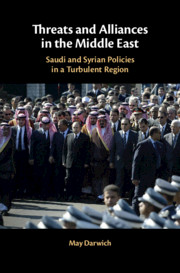Crossref Citations
This Book has been
cited by the following publications. This list is generated based on data provided by Crossref.
Quamar, Md. Muddassir
2020.
Changing regional geopolitics and the foundations of a rapprochement between Arab Gulf and Israel.
Global Affairs,
Vol. 6,
Issue. 4-5,
p.
593.
Sarı Ertem, Helim
and
Düzgün, Aslı Nur
2021.
Uluslararası İlişkiler Disiplininde Ontolojik Güvenlik Teorisi: Kavram ve Literatür Odaklı Bir İnceleme.
Güvenlik Stratejileri Dergisi,
Vol. 17,
Issue. 37,
p.
39.
Glombitza, Olivia
and
Ulrichsen, Kristian Coates
2021.
Between the Domestic and the International: Ideational Factors, Peacebuilding and Foreign Policy in the Middle East and the Persian Gulf.
The International Spectator,
Vol. 56,
Issue. 4,
p.
1.
Darwich, May
2021.
Alliance politics in the post-2011 Middle East: Advancing theoretical and empirical perspectives.
Mediterranean Politics,
Vol. 26,
Issue. 5,
p.
635.
Walsh, Tom
2022.
How to analyze visual propaganda in the Middle East: An analysis of imagery in the “Saudi Strike Force Movie”.
Digest of Middle East Studies,
Vol. 31,
Issue. 2,
p.
96.
Gengler, Justin
2023.
On the scarcity and promise of survey-based studies of international relations and security affairs in the Middle East.
Mediterranean Politics,
Vol. 28,
Issue. 3,
p.
422.
Walsh, Tom
2023.
Securitisation imperatives and the exaggeration of Iranian involvement with the Houthi movement by international actors.
Global Policy,
Vol. 14,
Issue. 2,
p.
385.
Buehler, Matt
and
Schulhofer-Wohl, Jonah
2023.
The international sources of prejudice against Shi‘a in the Middle East and North Africa: Original survey evidence from Morocco.
Mediterranean Politics,
Vol. 28,
Issue. 3,
p.
463.
Del Sarto, Raffaella A.
and
Soler i Lecha, Eduard
2024.
Regionalism and Alliances in the Middle East, 2011-2021: From a “Flash in the Pan” of Regional Cooperation to Liquid Alliances.
Geopolitics,
Vol. 29,
Issue. 4,
p.
1447.
Altunisik, Meliha
and
Koprulu, Nur
2024.
The quest to end marginalization: Jordan's diversifying alignments in the post‐Arab Spring era.
Digest of Middle East Studies,
Vol. 33,
Issue. 1,
p.
48.



